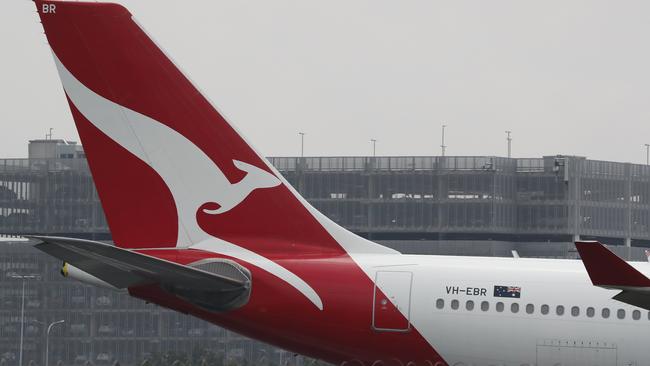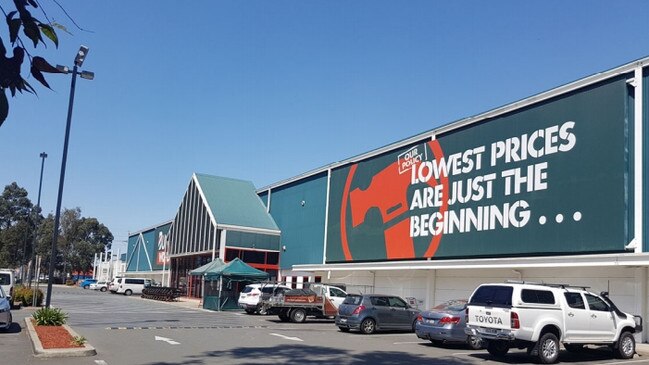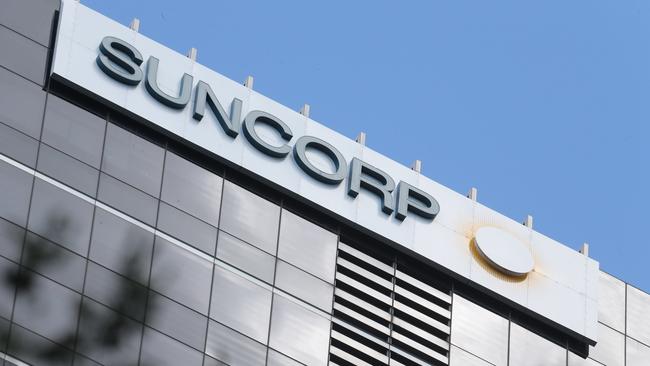Budget 2021: Stock winners and losers
The ASX-listed shares that get a boost and those that missed out in Josh Frydenberg’s big-spending budget.

Business
Don't miss out on the headlines from Business. Followed categories will be added to My News.
A cluster of ASX-listed companies ranging from retailers to suppliers of building materials are set reap the rewards of billions of new spending outlined in the federal budget.
But indications from the federal budget that the nation’s borders will mostly stay shut until mid-2022 has caused a sharp share price reaction from leading air travel-related stocks.
Qantas shares dived as much as 3.9 per cent to a three-month low of $4.48 a share, before closing at $4.50.
In a statement to the ASX, the airline said it aims to open its overseas travel network from late December rather than the end of October and will look to the domestic travel boom and potential for air-travel bubbles to support its earnings in the meantime.
Similarly, Sydney Airport shares dropped 4.8 per cent to a 2.5-month low of $5.76.
Flight Centre also dived 4.5 per cent to $14.77 and Corporate Travel fell 2.7 per cent to $16.92.

At the close of trade the S&P/ASX 200 was down 0.7 per cent at 7044.9, although that was on a sharply weaker lead from Wall Street and an afternoon sell-off in Asia.
Brokerage Macquarie Equities said the overall message is the budget supports “reflationary trades” in the sharemarket, as the ongoing pandemic provides “cover” for government spending, while commodities are set to benefit from infrastructure and construction stimulus globally.
“Specifically, we prefer cyclicals, given the expectation of stronger economic growth; domestic exposures, given the view that strong commodities will support the Australian dollar; value, as rising input costs signal rising inflation and create upside risks to bond yields,” said Macquarie equity strategist Matthew Brooks.
The brokerage has estimated that the newly announced measures will be worth approximately 2 per cent to disposable income from financial 2023-24.
The multi-billion extension of the instant asset write off in the budget is expected to be positive for office and small-to-mid-sized business suppliers such as – including tools, computers, utes and office furniture supplied by ASX-listed companies including Wesfarmers (which owns Bunnings and Officeworks), JB Hi-Fi, Eagers Automotive and four wheel drive accessories business ARB Limited.

Coupled with the tax loss carry back, the measures worth $20bn over two years can bring forward other investment, benefiting stocks in infrastructure including APA Group, AusNet Services and Spark Infrastructure, as well as Cleanaway Waste Management, Sealink Travel Group and BWX.
The government’s pre-announced $10bn package of extra infrastructure funding and a range of housing stimulus measures should support home construction.
Among the key beneficiaries in the infrastructure and construction sectors mentioned by Macquarie Group are Downer EDI, Seven Group, CIMIC and CSR.
And while no package in isolation is material for residential developers, the announcements continue to show government support for housing – particularly first home buyers.
Builders will get a boost from the federal government confirming the extension of the HomeBuilder benefit time frame to 18 months, while an additional 10,000 places were provided in the First Home Loan Deposit Scheme.
This will provide incremental growth to Mirvac and Stockland, Macquarie noted.
Elsewhere the focus on supply chains and digitisation through the economy, while likely to be longer-dated in their impact, this will boost demand for logistics players. Here Macquarie said Goodman Group is likely to benefit supported by tenant relationships and its development pipeline.
Childcare players including G8 Education, Kip McGrath and Mayfield Childcare will benefit from childcare subsidies that are set to be increased by 30 per cent for the second and subsequent children. This is expected to cost $1.7bn over the five years of the program, although this is a longer dated measure as the scheme does not start until July 2022.

JP Morgan said the budget also has a number of positive implications for the diversified financials and insurance sector.
The move to cease the employment taxing point for the tax-deferred Employee Share Schemes available for all companies could increase the attractiveness of employee share schemes, helping Link Administration and to a lesser extent, Computershare.
“Employers use ESS to attract, retain and motivate staff by issuing interests such as shares, rights – including options – and other financial products to employees, usually at a discount,” said JP Morgan analyst Siddharth Parameswaran.
“This change will result in tax being deferred until the earliest of the remaining taxing points.”
For general insurance – Suncorp, IAG and QBE Insurance – he sees two positive initiatives: funding for enhancing disaster resilience – the government will provide $615.5m over six years to support disaster risk-reduction activities; and the establishment of a reinsurance pool for cyclones and related flooding that will be backed by a $10bn government guarantee.
“At the margins, these schemes could improve the affordability of insurance for those in high-risk parts of Australia. This would help with underinsurance and reduce disaster costs at the margins,” Mr Parameswaran said.
“However, this will take time to filter through lower insurance premiums and claims.”

Elsewhere the Government is also investing a further $1.9bn in the COVID-19 vaccination roll-out, which could give CSL which manufactures the AstraZeneca vaccine a boost.
CSL could also benefit from the “patent box” to encourage medical a biotechnology
innovation through a 17 per cent concessional corporate tax rate for locally developed or patented products. Other beneficiaries may include Cochlear and Resmed.

Macquarie’s Mr Brooks also noted that the budget forecast of a fiscal 2022-23 cash deficit of $107bn – equal to 5 per cent of GDP – is larger than Macquarie’s economics team expected, but that may be “conservative” since the budget assumed an iron ore price of $US55 a tonne by March 2022 whereas the iron ore price recently hit a record high near $230 a tonne.
“One lesson from the post-GFC experience was not to withdraw fiscal stimulus too quickly,” Mr Brooks said.
“By not pushing too quickly for a balanced budget, the government is supporting growth and arguably reducing the disinflation trends seen after the GFC.
The budget also minimises the risk that the recovery could be derailed by another shock such as a new COVID variant or more material problems with vaccines.
“By minimising downside risks, the budget supports the case for equities.”
Originally published as Budget 2021: Stock winners and losers



